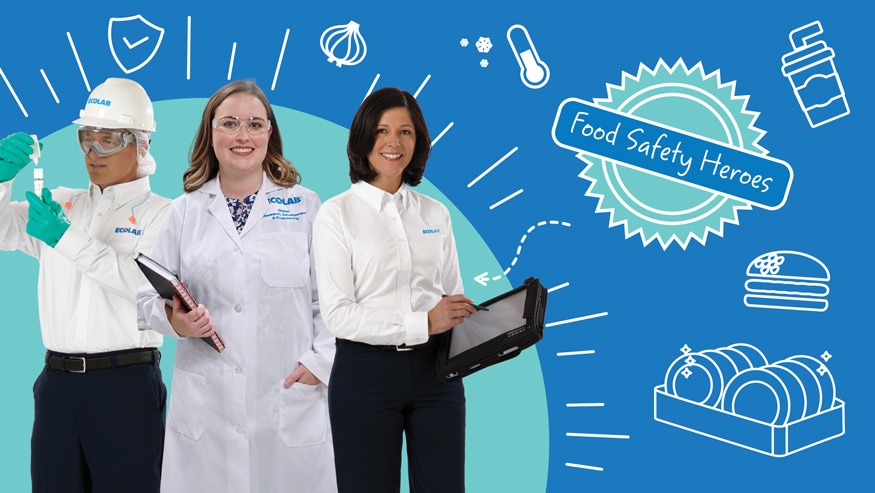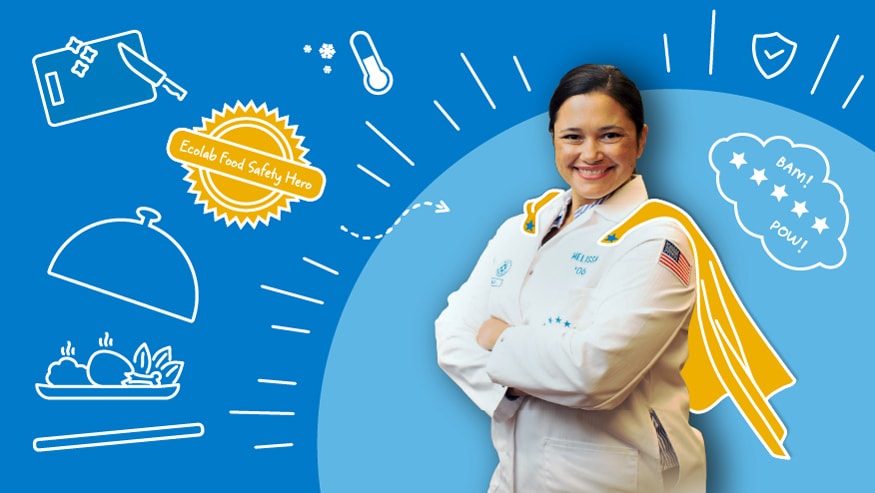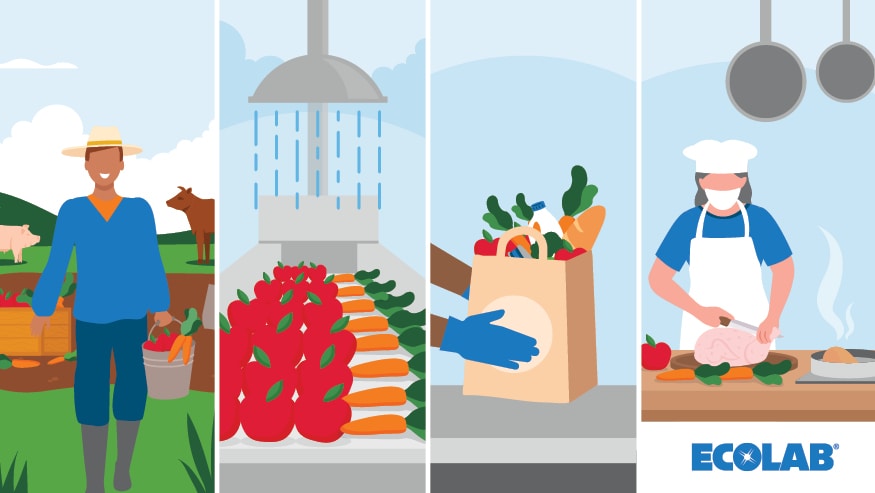Food Safety Superhero: Domino’s Josh Giefer Is Serving Up Food Safety, One Slice at a Time

When COVID-19 was first declared a pandemic, many food safety professionals were thrust into the public health spotlight almost overnight. As food businesses were looking to put their customers’ minds at ease, food safety professionals took on additional responsibilities to help ensure consumers continued to receive safe, high-quality food. These individuals also helped advance public health best practices such as mask wearing, social distancing, handwashing and enhanced cleaning, disinfection and sanitization.
Mandy Sedlak, an Ecolab senior manager of Food Safety and Public Health, sat down with several food safety professionals to discuss the importance of food safety and public health during the COVID-19 pandemic.
Meet Josh Giefer, a food safety superhero who has helped protect the public from foodborne illness and COVID-19 and manager of Global Food Safety and Regulatory Compliance at Domino’s.
Mandy: Thank you for sitting down with us today to talk about food safety. We know that you have a long history with Domino’s and other leading brands. How did you first get interested in food safety?
Josh: My father was a Domino’s franchise owner, and I first became interested in food safety working in his restaurants. My first job was folding pizza boxes for a penny per box, before I was promoted to dishwasher and then helping manage and open new stores. I remember my father driving home the importance of food safety best practices like keeping the restaurant clean and making sure the coolers were working properly. All those practices helped ensure our customers were comfortable ordering from us.
Mandy: Now that we know how you got started in food safety, can you tell us a little bit more about why is food safety important to you now?
Josh: There are several reasons but, first and most importantly, I want to make sure consumers have the safest product. I don’t want anyone to be eating anything unsafe. The second reason is that, at Domino’s, we want to make sure that we are building trust and confidence in our products and our brand. We need to continually demonstrate food safety every day through great execution, proper team member training and communicating to our customers. If they can trust the product, they can enjoy the product. Pizza is supposed to be fun and having a safe product goes naturally along with that.
Mandy: Now we’re going to shift to the COVID-19 pandemic. We know that many food safety professionals also took on a public health role and juggled multiple responsibilities. How have you and your team advanced food safety during the pandemic?
Josh: Those of us in food safety and quality assurance were the science and public health experts in restaurants, and we all became hot commodities overnight. We were used to dealing with foodborne illness, but now we were dealing with a virus that was airborne. There wasn’t really a playbook of how to respond, but we knew we had to lead with our values and prioritize safety and execute from there.
One example of this was our pizza pedestal. We wanted to make sure our customers could still trust that the product was safe during contactless deliveries. So, we created this pizza pedestal, which was a cardboard stand that kept the product off the ground when drivers were making contactless deliveries, and made sure we weren’t introducing new contaminants on the ground to the product. It helped give customers that peace of mind in adjusting to a new delivery format.
Mandy: How has the COVID-19 pandemic changed your view of food safety and public health?
Josh: Historically, we’re used to food safety being focused on foodborne illnesses, but it’s morphing into overall illnesses and public health in general. I think we’ll only continue to see things move in that direction. I also think more responsibility is going to be put on businesses to proactively address other public health concerns. For us in restaurants, it’s no longer just food safety, it’s food safety plus consumer safety.
Mandy: It’s been great talking to you, and we always enjoy the insights that you share. I want to say thank you for what you do every day for guests, for our communities, for ourselves and our families. Is there anything else you want to add?
Josh: It’s important to remember that food safety and managing through the COVID-19 pandemic is a huge team effort. So, I wanted to thank my team for their support. In particular, I want to thank our franchisees, who have been integral in implementing these new food safety and public health standards across our restaurants every day.
Related Content:

Food Safety Superheroes: How These Ecolab Associates Are Helping to Provide Safe Food
For U.S. National Food Safety Month, we highlighted several Ecolab associates who stepped up to protect the public from foodborne illness and COVID-19.

Keeping Our Guard Up Against Foodborne Illness
In recognition of World Food Safety Day, Ecolab's experts reflected on the strides that the food industry has made in the last year and what can be done to keep the momentum going.

The Importance of Building a Strong Food Safety Culture
Rick Stokes, technical support manager in the Food & Beverage division at Ecolab, outlines how companies can create a food safety culture to prevent foodborne illnesses.


